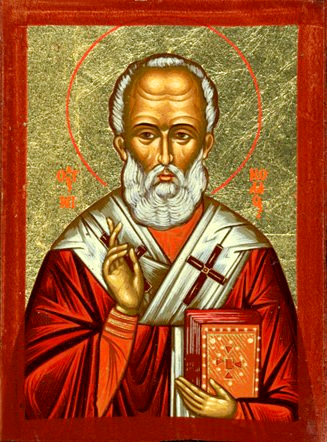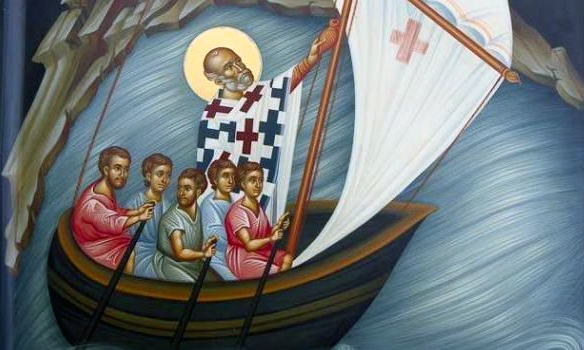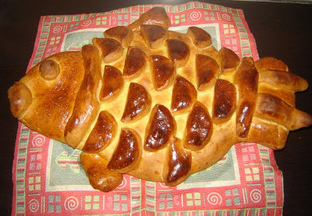 There are two Orthodox holidays in Bulgaria, devoted to St. Nicholas Wonderworker, Archbishop Mirlikiyski – on December 6 and on May 9 (the so-called Summer St. Nicholas’ Day). Every Thursday is also devoted to the saint. “Rule of faith and sample of meekness, teacher of temperance” – that is how the gradual song, sung on this day describe the saint. Only John the Baptizer has been honored that way. December 6th, the date when St. Nicholas presented himself before God, is one of the biggest Orthodox holidays. The saint is largely honored by Bulgarian tradition as well. According to researchers, his folklore image combines the qualities and skills of a hero with supernatural powers and bravery – he is the master of sea, waters and winds. A true hero, who had wings and protected people from the evil sea creatures causing storms and misery.
There are two Orthodox holidays in Bulgaria, devoted to St. Nicholas Wonderworker, Archbishop Mirlikiyski – on December 6 and on May 9 (the so-called Summer St. Nicholas’ Day). Every Thursday is also devoted to the saint. “Rule of faith and sample of meekness, teacher of temperance” – that is how the gradual song, sung on this day describe the saint. Only John the Baptizer has been honored that way. December 6th, the date when St. Nicholas presented himself before God, is one of the biggest Orthodox holidays. The saint is largely honored by Bulgarian tradition as well. According to researchers, his folklore image combines the qualities and skills of a hero with supernatural powers and bravery – he is the master of sea, waters and winds. A true hero, who had wings and protected people from the evil sea creatures causing storms and misery.
There are lots of folklore tales and legends about St. Nicholas. One of them is related to his two fests and the jealousy of another saint they caused – St. John Cassian the Roman, whose memory is honored on February 29th by the Orthodox Church (the Catholic church hasn’t canonized him officially). When the year is not a leap one, the service takes place on February 28th. The folklore archives of Dimitar Marinov from the area of Veliko Tarnovo claim that the name is St. Cassian only and the fest takes place once every four years. He is described as a wealthy man with a long fox fur coat who smokes a long pipe – chibouk. He sits on a long couch all day long and no sun touches him, nor rain, nor wind. St. Cassian got sad that his holiday was once per four years and with no special honors. Then he thought about St. Nicholas and his two festdays, got on his feet and went to the Lord, looking for justice. ‘Oh, God,’ he exclaimed. ‘Is this right – I am a saint and St. Nicholas is a saint as well. My holiday is once in four years and his takes place each year and even twice – with songs, rituals and fiestas!’ The Lord asked St. Cassian to wait for a while, then sent an angel to find St. Nicholas and bring him upstairs.
 The angel flew down to the earth to deliver the message. Then he saw the sea – dark and in the middle of a fierce tempest. There he was – St. Nicholas, saving ships and people from the disaster. The angel delivered the message of God and the saint answered that he would be with him in a minute. However, quite a lot of time had passed prior to his arrival before God. ‘Forgive me, my Lord, for this delay, but I had been fighting with the sea abyss and the storms, trying to keep from sinking vessels, full of passengers. I am wet and muddy all over, but the angel said to come immediately…’ Then God turned to St. Cassian and said: ‘Do you see how wet he is? This fight with the storms and winds with the purpose of saving lives has established the two holidays for him, not me. If you spend the whole day on the couch smoking, then even one festive day every four years is too much for you.’ St. Cassian left in shame and St. Nicholas returned to his marine battle.
The angel flew down to the earth to deliver the message. Then he saw the sea – dark and in the middle of a fierce tempest. There he was – St. Nicholas, saving ships and people from the disaster. The angel delivered the message of God and the saint answered that he would be with him in a minute. However, quite a lot of time had passed prior to his arrival before God. ‘Forgive me, my Lord, for this delay, but I had been fighting with the sea abyss and the storms, trying to keep from sinking vessels, full of passengers. I am wet and muddy all over, but the angel said to come immediately…’ Then God turned to St. Cassian and said: ‘Do you see how wet he is? This fight with the storms and winds with the purpose of saving lives has established the two holidays for him, not me. If you spend the whole day on the couch smoking, then even one festive day every four years is too much for you.’ St. Cassian left in shame and St. Nicholas returned to his marine battle.
 Rich festive table is prepared on this day and it should stay throughout the entire holiday. Stuffed carp, wrapped up in dough is mandatory, alongside two ritual loaves of bread, boiled corn, wheat or manna croup. Both the fish and the loaves are blessed by a priest at home, or are carried to the local church. Depending on the region and the preferences of the people the festive table also includes beans, cabbage and sarmi – stuffed cabbage leaves with rice. St. Nicholas’ chants are sung, telling about the myths of the saint. He would mostly sit and drink with other saints at an ‘honest table’. The songs also tell about his sea battles and the people rescued who would believe in God and St. Nicholas after their rescue.
Rich festive table is prepared on this day and it should stay throughout the entire holiday. Stuffed carp, wrapped up in dough is mandatory, alongside two ritual loaves of bread, boiled corn, wheat or manna croup. Both the fish and the loaves are blessed by a priest at home, or are carried to the local church. Depending on the region and the preferences of the people the festive table also includes beans, cabbage and sarmi – stuffed cabbage leaves with rice. St. Nicholas’ chants are sung, telling about the myths of the saint. He would mostly sit and drink with other saints at an ‘honest table’. The songs also tell about his sea battles and the people rescued who would believe in God and St. Nicholas after their rescue.
The saint is considered to be the protector of children, fishermen, sailors, travelers, traders and bankers and also of the house and the family, the wealth and the farm animals. Some sources say that he is the patron of thieves, brewers, coopers, pharmacists and prisoners as well. In Bulgaria this is the name day of Nikola, Nikolay, Nikol, Nikolina, Nikoleta, Nina etc.
English version: Zhivko Stanchev
The feast of the Annunciation (Blagoveshtenie in Bulgaria) is a holy day , a symbol of God’s infinite mercy to people and especially to women, blessed to bear new life, but also an embodiment of the eternal human longing for something better in the..
Clocks and bells will ring out in the center of Stara Zagora on Saturday, when the city will host the XXIV Masquerade Games Festival . The event will start with a traditional parade of participants. Attractive babugers, araps, old men and other..
Today marks the 88th anniversary of the birth of remarkable Bulgaria folk singer Nadka Karadzhova . Born on March 14, 1937 in the then Pazardzhik village of Trivoditsi (today - Plovdiv region), she is a descendant of an old musical family. At the age..

+359 2 9336 661
